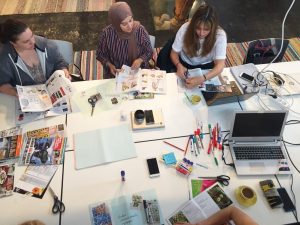Yli 90 osallistujaa Euroopasta, Aasiasta ja Amerikasta kokoontui juhannuksen alla Lontooseen keskustelemaan kiertotalousopetuksen kansainvälisestä kehittämisestä ja luomaan uutta verkostoa kehittämistyön…
Tekijät | Authors

Just do it! – A story of learning in a project
Translated from the Finnish article ”Hanskat käteen ja kehään – yhden projektin tarina oppimisesta”
What is studying like when it is not just sitting in a classroom in front of the teacher? It is exciting, funny and sometimes even scary! It calls for throwing yourself into it and courage to let go of routines. It challenges you in a brand new way: takes you into difficult situations, pushes you to the limit and can even lead to conflicts. At the same time, it reveals your strengths and development targets as a learner. Ultimately, it brings the joy of success.
The six exchange students who participated in the international research hatchery in the autumn term 2018 had the chance to experience all this. The research hatchery was led by the Circular Business Models research group of Turku University of Applied Sciences. During the research hatchery, the students kept a learning diary on the basis of which they prepared a learning report at the end of the research hatchery. The learning report is used to record ideas and experiences about one’s learning during the hatchery. It is also an important tool for the teacher in evaluating the students’ learning.
This article takes a closer look at students’ opinions about the research hatchery. This is the story of one project and the learning of six students.
Failure does not prevent learning
The students received an assignment from Helsieni Oy, which grows mushrooms in local raw materials, such as used coffee grounds. The students were to look for reasons for the dilapidation of the coffee grounds used as a mushroom growing medium by investigating in which temperatures coffee grounds are kept in different cafés and the conditions in which coffee grounds become dilapidated.
In the same way as working life projects, students’ projects do not always proceed as planned. In the end the students did not achieve the original goal of the project, which they feel was due to a lack of experience, failure to communicate and problems in laboratory work. However, difficulties in proceeding with the project did not prevent learning – on the contrary.
”Although we didn’t achieve the main goal – -, the whole process taught me a lot”, said one of the students in the learning report. ”The research hatchery improved my skills considerably. Meetings, research work and all the challenges we faced taught me communication skills, management of time, pressure tolerance, conflict solving ability as well as adaptability. The research hatchery also taught innovativeness and the ability to be open to new ideas.”
Difficulties in proceeding with the project did not prevent learning – on the contrary.
The success of the research hatchery can thus not be measured solely in terms of how well the students were able to solve the problem assigned to them. The company commissioning the task has its own wishes and goals, though it is should be remembered that the students in the research hatchery are just learning.
Multidisciplinarity forces one to face difference
The research hatchery looks at learning from a highly different perspective than traditional teacher-based teaching. In the research hatchery, students are teachers for themselves and the whole group. Learning takes the form of doing, talking, looking for information as well as solving problems independently.
”The research hatchery is really the opposite of traditional classroom teaching, as it allows students to access information directly while the teacher acts more as a coach or mentor”, said one of the students.
One of the starting points in the research hatchery is multidisciplinarity. When students from different backgrounds and different competences together set out to solve the same problem, the outcome will probably be something novel if only they know how to make use of each other’s skills. In working life, projects are carried out between different people, so it is also important to practice this during studies.
Learning takes the form of doing, talking, looking for information as well as solving problems independently.
Working in multidisciplinary teams can also be difficult, at least at first. In addition, there are many types of viewpoints in a research hatchery consisting of international students. Even the lack of a common language does not prevent the students from experiencing something unique.
”Our group consisted of people from different countries and backgrounds. This gave us a global perspective to the challenge and helped us solve it. Sometimes the language barrier turned out to be a challenge, because it is not easy to express opinions in a foreign language. However, communicating in a small group was easy and the working atmosphere was good”, said one of the students about the group’s work.
Turku University of Applied Sciences wants to develop the innovation competences of its students, i.e. important working life skills for present and future needs. Innovation competences can be developed through innovation pedagogy, and in a way competences develop automatically while studying in a project. It appears from the learning reports that the students often had to work in the discomfort zone and thereby challenge themselves and take responsibility for their learning.
”We had misunderstandings and difficulties to continue the project and also lacked material at times. However, we managed to solve all problems and developed quickly, so the experience was nice”, said one of the students.
Problems need not be solved alone
The development of communication skills is frequently mentioned in the learning reports. All the students mentioned it in their reports. Communication skills are very important when working towards a common goal. Especially if the question is of a multidisciplinary group, communication between the group members is invaluable.
”Although I still have a lot to develop, I was able to really improve my communication skills in the research hatchery. – I can tell about my ideas clearly and to the point and express myself in an open, non-threatening way. I also learnt to listen to others’ opinions, as it is important to remember that the group is not a unit where everybody thinks the same way and want the same things. There are always differences in people’s ambitions, needs and aspirations”, said one of the students.
The students also learnt the power of cooperation during the research hatchery. Problems were overcome by thinking together how they should be solved. Nobody had to face uncertainty alone because the other group members were there to help: ”One of the best things I learnt was to ask for help if I didn’t know how to proceed alone,” said one of the students. ”I somebody had a problem, we would together think how we could solve it,” said another.
The students also learnt the power of cooperation during the research hatchery.
External experts were also strongly present in the research hatchery, including the personnel of Turku University of Applied Sciences or experts from different companies, from whom the students could learn and also receive help for completing the project. The importance of cooperation is emphasised in project-type studying in a different way than in traditional classroom teaching. ”We faced many problems during the project but managed to achieve the final goal together with the group members and experts,” said one of the students.
So let’s just do it! What could be a more effective way to get to know future working life.
The students received the assignment as part of the 6Aika: The Circular Economy Centres of the Future project. The project develops new circular economy business and supports the commercialisation of circular economy innovations in the area of the six biggest cities in Finland.
__________________________________________________________________________
Download the Methods for Circular Economy Teaching – Method Guide and Tool Kit for free.








